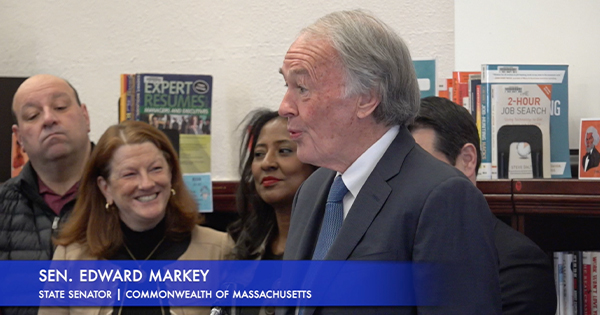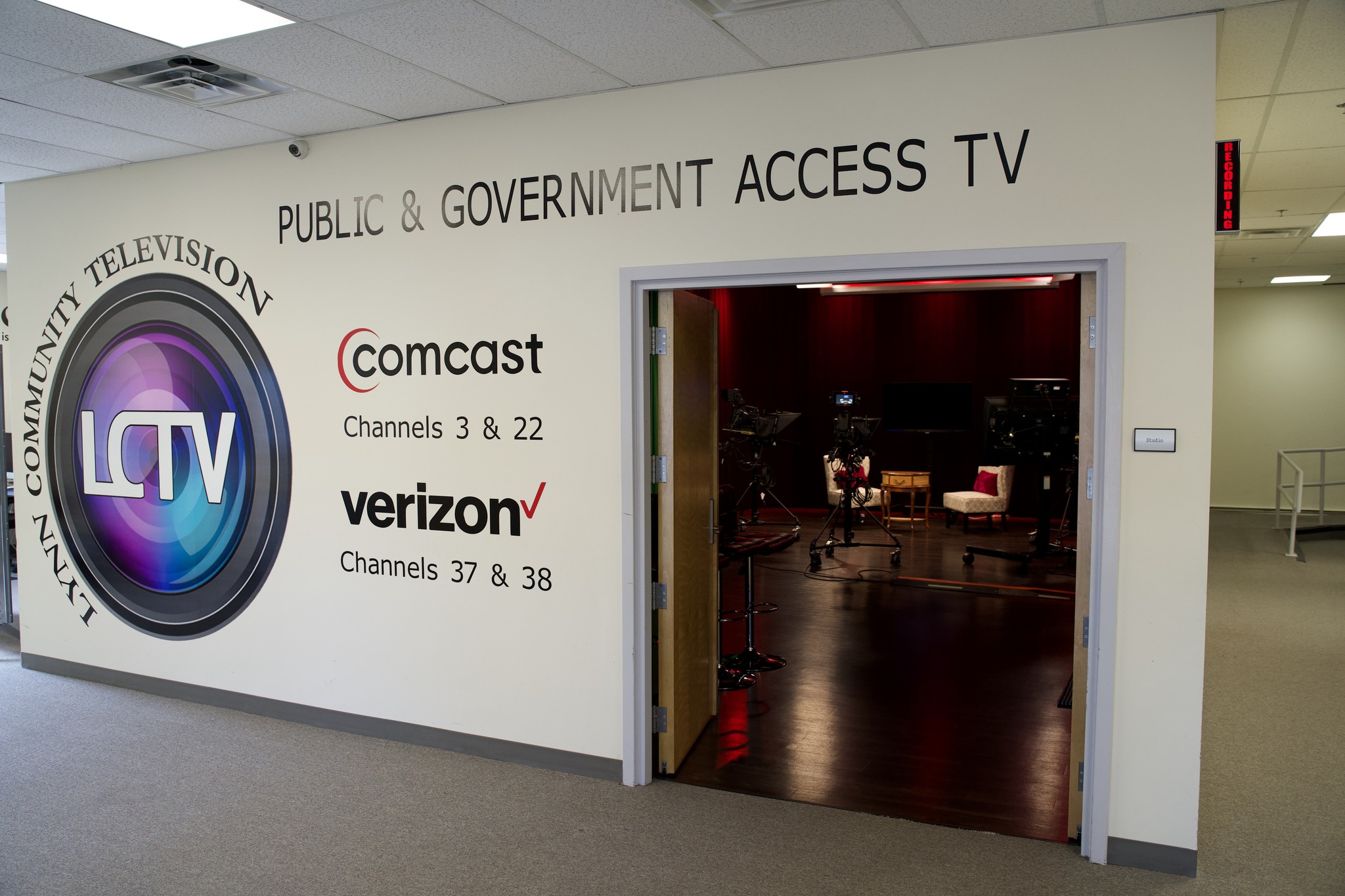
Senator Edward J. Markey (D-Mass.), a member of the Commerce, Science, and Transportation Committee, along with the Massachusetts Statewide Digital Equity Coalition, today called on Congress to extend funding for the Affordable Connectivity Program (ACP), which is set to expire in April. The state and local leaders joined Senator Markey today at the Lynn Public Library to highlight the need for the federal program, which provides funding for connectivity for 23 million households, including 366,000 households in Massachusetts. The ACP is a $14.2 billion program established by the Bipartisan Infrastructure Law in 2021 and managed by the Federal Communications Commission (FCC) to ensure that every household in the United States can afford Internet access.
“The end of the Affordable Connectivity Program would be a lose-lose-lose — a loss for families, a loss for our economy, and a loss for our democracy. We must treat internet access like a public good and ensure that everyone is connected online. It is absolutely vital that Congress provide additional funding to the ACP and close the digital divide once and for all,” said Senator Markey.
“Lynn is proud to take advantage of the Affordable Connectivity Program – roughly 7,300 households in Lynn currently participate. That number represents so many of our students’ ability to get their homework done, so many of our residents’ ability to attend critical telehealth appointments, and for some, to actually do their job with remote work. The ACP plays a critical role in minimizing the digital equity gap, and failing to extend the program will cause so many of our residents to lose access to a number of opportunities,” said Lynn Mayor Jared Nicholson.
“In Worcester, more than 30,000 households rely on the Affordability Connectivity Program (ACP) for internet access – roughly 71% of the 42,567 eligible households. The city’s high adoption rate is the result of a hard-working coalition of community partners led by the Worcester Public Schools, which has engaged families and programs to educate them on the program,” said Worcester City Manager Eric D. Batista. “If those families are forced to cut their internet access, it will have a devasting impact on their lives, including the loss of access to telehealth services, job opportunities, news, local announcements, and more. Worcester’s Digital Equity Working Group is focused on closing the digital gap, not widening it. The ACP is essential, and it is critical that it receives renewed funding.”
LCTV’s coverage of the visit
“The City of Boston continues to call on Congress to extend funding for the vital Affordable Connectivity Program immediately. At a time where cost of living feels more challenging than ever, without ACP, families will have to choose between being connected and paying for other basic needs,” said Santiago Garcés Escobar, Chief Information Officer for the City of Boston.
“With workforce challenges, digital access provides capacity for our providers to have flexibility in their schedules, and it helps patients and community members access the services we provide with ease,” said Lynn Community Health Center CEO Brenda Rodriguez. “Affordable internet access incentivizes us as healthcare practitioners to incorporate strategies into our community support programming to include digital technology and literacy for our patients.”
“Technology access and digital skills are no longer a luxury; they are a necessity to participate in our democracy, and to live fully in our communities and in the world. While we urge members of Congress to expand affordable internet access through the ACP Extension ACT, the Alliance welcomes organizations and individuals across western Massachusetts to join us in collectively developing and providing affordable, accessible internet for all,” said Kathy Bisbee, Director of the Alliance for Digital Equity.
“Congress created ACP because it recognized that a broadband connection is critical to everyday life – accessing government services, health care, education, civil engagement, and employment. As the critical need of an internet connection has not ended, neither should ACP,” said Virginia Benzan, Director of Racial Justice Advocacy at Massachusetts Law Reform Institute.
“From our decades of experience working to expand digital access in Massachusetts, we know that access to affordable broadband services is not a luxury, but an essential utility, just like housing, water, heat, or electricity,” said Caitlin Schubert, ACP Manager at Tech Goes Home. “Across Massachusetts, more than 360,000 households are currently enrolled in the Affordable Connectivity Program (ACP), all of whom rely on this program to fully participate in society. Allowing ACP to lapse will create a devastating cliff for individuals and families who would see their internet bills increase to the tune of hundreds of dollars per year, and prevent many from accessing vital resources in the community that rely on access to broadband. Long-term, sustainable funding for the ACP is essential to ensuring households across Massachusetts have access to broadband and the ability to participate fully in society. We are grateful to Senator Markey for shining a light on this urgent issue, and to him and his colleagues in the Massachusetts delegation for their support of the ACP.”
“Every person in Massachusetts deserves equitable access to affirming healthcare, and the Affordable Connectivity Program (ACP) helps make that a reality by bringing high-speed internet into the homes of hundreds of thousands for whom telehealth would otherwise not be an option. We applaud Senator Markey for his unyielding commitment to giving every person across the Commonwealth access to the technology necessary to learn, work, and be healthy,” said Transhealth President and CEO Dallas Ducar.
“Funding the ACP is not just an internet access issue – it’s a healthcare issue. Modern healthcare is intrinsically linked to internet access. The Affordable Connectivity Program fosters health equity and access among those who need it most,” said Mass General Brigham ER physician, Link Health Founder, and Harvard Assistant Professor Dr. Alister Martin.
“Reliable broadband is no longer a luxury, it is a necessity to function in society today. Over 20 million Americans and over 300,000 Massachusetts residents rely upon ACP for access to health care, education, transportation and personal safety services. It is imperative that Congress act swiftly to reauthorize and enhance this critical program,” said Steve Smith, Executive Director of the Cape Cod Tech Council.
In October 2023, Senator Markey co-signed a letter, led by Senator Jacky Rosen (D-Nev.), calling on congressional leaders to extend funding for the Affordable Connectivity Program. He is also a cosponsor of the bicameral Promoting Access to Broadband Act, which would help increase enrollment in the ACP and the FCC’s Lifeline program. Senator Markey is the House author of the original E-Rate program, which has invested nearly $62 billion in schools and libraries across the country. Massachusetts schools and libraries have received more than $876 million from the E-Rate program and another $97 million from the Emergency Connectivity Fund, a $7 billion program that Senator Markey created within the American Rescue Plan to provide devices and connectivity for students and educators at home.
The above press release was submitted to us by Mayor Nichsolon’s office.
If you have a news story that you would like to share, please contact us via email or call 781-780-9460.

